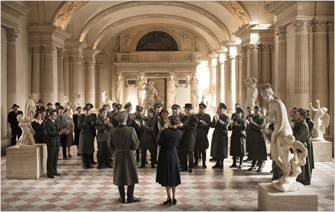
I wanted to see Alexandre Sokourov’s film Francofonia: Le Louvre sous l’Occupation because I am interested in the subject, especially after having read and reviewed the book Saving Mona Lisa: The Battle to Protect the Louvre and Its Treasures During World War II, by Gerri Chanel. The book is a blow-by-blow (sometimes too many blows) account of how the Louvre’s staff heroically planned and executed the removal and protection of almost all the museum’s artworks even before the war started.
Although the subject matter is the same, the film couldn’t possibly be more different. It attacks the subject obliquely, to say the least, beginning mysteriously with a Russian-speaking narrator (the director, whom we never actually see) trying with intermittent success to Skype with the captain of a ship carrying a museum’s artworks as it flounders in a storm on the high seas.
The rest of the film alternates between historical footage of Paris during the Occupation and the USSR during the war with fictionalized shots of the Louvre made to look like period shots. The focus is on then-director of the Louvre Jacques Jaujard and Count Franz Wolff-Metternich, the art expert in charge of the Kunstschutz, the German cultural heritage protection agency in Occupied France. Together, the two managed to prevent the Louvre’s treasures from being shipped off to embellish German collections.
Interspersed with caressing shots of various artworks belonging to the Louvre are occasional scenes in which an actress playing Marianne, the female symbol of France, pops up in the empty halls of the Louvre, weaving around and shouting “Liberté, Egalité, Fraternité,” sometimes in the company of another actor playing Napoleon, who takes credit for collecting (read “looting” from conquered countries) the works in the museum.
The Russian voiceover continues throughout the film, with periodic returns to the online conversation between the Russian man and the ship’s captain, who is apparently in danger of losing some of his precious art cargo.
This is one of the strangest films I have ever come across. Mystified, I went to the reviews to try to comprehend it. They range from a rave from Les Inrockuptibles, which calls it a “poetic, artisanal” filmed essay, to a pan from Libération, which describes it as “a dusty ode to patrimonial culture, shaped from an outdated fascination with great art as the glue of civilizations.” I’m afraid I will have to agree with the latter opinion of this contrived, occasionally hokey (Marianne) film.
Favorite
